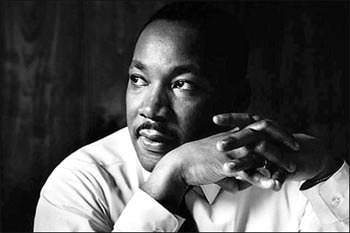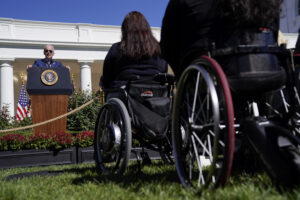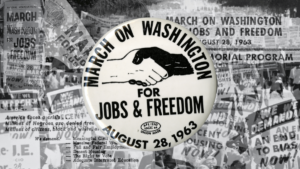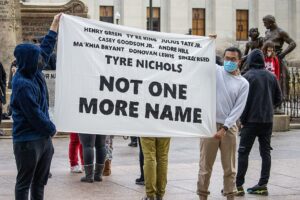Martin Luther King Jr.: ‘A Society Gone Mad on War’
During the Vietnam War, Dr. King referred to our nation's government as "the greatest purveyor of violence in the world today." Now that we find ourselves mired in another senseless conflict, our soldiers in harm's way and more and more among us suffering from the tyranny of poverty, we turn once again to the wisdom of Martin Luther King Jr.
When Martin Luther King Jr. spoke out against the Vietnam War, he angered those who couldn’t see the connection between segregation in the American South and burning villages in Southeast Asia. King responded sagely (from “Beyond Vietnam”):
There is at the outset a very obvious and almost facile connection between the war in Vietnam and the struggle I, and others, have been waging in America. A few years ago there was a shining moment in that struggle. It seemed as if there was a real promise of hope for the poor — both black and white — through the poverty program. There were experiments, hopes, new beginnings. Then came the buildup in Vietnam and I watched the program broken and eviscerated as if it were some idle political plaything of a society gone mad on war, and I knew that America would never invest the necessary funds or energies in rehabilitation of its poor so long as adventures like Vietnam continued to draw men and skills and money like some demonic destructive suction tube. So I was increasingly compelled to see the war as an enemy of the poor and to attack it as such.
As I have walked among the desperate, rejected and angry young men, I have told them that Molotov cocktails and rifles would not solve their problems. I have tried to offer them my deepest compassion while maintaining my conviction that social change comes most meaningfully through nonviolent action. But they asked — and rightly so — what about Vietnam? They asked if our own nation wasn’t using massive doses of violence to solve its problems, to bring about the changes it wanted. Their questions hit home, and I knew that I could never again raise my voice against the violence of the oppressed in the ghettos without having first spoken clearly to the greatest purveyor of violence in the world today — my own government. For the sake of those boys, for the sake of this government, for the sake of hundreds of thousands trembling under our violence, I cannot be silent.
Over the past two years, as I have moved to break the betrayal of my own silences and to speak from the burnings of my own heart, as I have called for radical departures from the destruction of Vietnam, many persons have questioned me about the wisdom of my path. At the heart of their concerns, this query has often loomed large and loud: Why are you speaking about war, Dr. King? Why are you joining the voices of dissent? Peace and civil rights don’t mix, they say. Aren’t you hurting the cause of your people, they ask? And when I hear them, though I often understand the source of their concern, I am nevertheless greatly saddened, for such questions mean that the inquirers have not really known me, my commitment or my calling. Indeed, their questions suggest that they do not know the world in which they live.
Now, with our nation mired in another senseless conflict, our soldiers in harm’s way and more and more among us suffering from the tyranny of poverty, we turn once again to the wisdom of Martin Luther King Jr.
Listen to Martin Luther King Jr. explain his opposition to the war:
Code Pink’s tribute to Martin Luther King Jr.:Speeches:
- Beyond Vietnam – 4 April 1967
- Acceptance Speech at Nobel Peace Prize Ceremony – 10 December 1964
- I’ve Been To The Mountaintop – 3 April 1968 (King’s last speech)
Find more at the King Papers Project
Also, from our MLK coverage last year:
As we observe Martin Luther King Jr. Day against the backdrop of a war openly assailed by members of both parties of Congress, and a scandal involving wiretaps of U.S. citizens suspected of being in league with enemies of the state, it behooves us to recognize how cyclical is the nature of American politics and policy, for Dr. King was facing those very same issues in the 1960s.
Not only was Dr. King the object of a massive, illegal eavesdropping program aimed at painting him as a sexual deviant and a Communist fifth columnist, but he was also demonized for his opposition to the Vietnam War by the same media organizations that had practically canonized him a few years before.
Truthdig has assembled a selection of resources highlighting various aspects of Dr. King’s life that seem particularly pertinent to current-day discussions of liberties at home and sovereignty abroad.
Update: Download an audio Mp3 version of Dr. King’s controversial “Beyond Vietnam” speech, in which he called America the “greatest purveyor of violence in the world today.” Right-click on this link and select “save link/target as” (file is 24 megs and runs about an hour).
MLK and Spying
- Spying on Martin Luther King Good, brief primer on the FBI’s surveillance of Dr. King, with tie-ins to the current wiretapping scandal, written by constitutional lawyer John Rutherford.
- King and the FBI
- The FBI’s Vendetta Against Martin Luther King Jr.
- The FBI’s Covert Action Programs Against American Citizens: Dr. Martin Luther King Jr. Case Study An extremely detailed report produced by the U.S. Senate Select Committee to Study Governmental Operations With Respect to Intelligence Activities, the so-called Church Committee, which the Senate convened in the mid-1970 to document a variety of abuses by American intelligence agencies. (Increase your font size to read the document.)
- Presidential Power in Wartime NPR program “On Point,” from Dec. 22, 2005, in which Nixon press aide and veteran presidential advisor David Gergen talks about the FBI’s illegal surveillance of Dr. King.
- “Suicide” Letter See the actual letter that the FBI sent to Dr. King in 1964, urging him to commit suicide or face the disclosure of surveillance tapes of his alleged extramarital affairs.
- FOIA Documents Hundreds of pages of FBI documents relating to Dr. King released under the Freedom of Information Act.
Scroll down to the section that reads “King and the FBI” in this Wikipedia article for another brief overview of the King-FBI surveillance saga.
A factually rich but poorly formatted treatment of the FBI’s wiretapping activities of Dr. King, excerpted from the book “The Lawless State: The Crimes of the U.S. Intelligence Agencies,” by Morton Halperin, Jerry Berman, Robert Borosage, Christine Marwick.
King the “Radical”
Exactly one year before he was assassinated in 1968, Dr. King delivered a speech at the Riverside Church in New York City entitled “Beyond Vietnam: A Time to Break the Silence,” in which he called America the “greatest purveyor of violence in the world today.” Time magazine, which had declared King “Man of the Year” in 1964, now accused him of providing succor to Hanoi. The Washington Post said that King had “diminished his usefulness to his cause, his country, his people.”
Text of speech Audio download (Right-click on the link and select “save link/target as”–file is 24 megs and runs about an hour.)
To better understand this seeming about-face, and to get a bead on why many history books leave out or paper over the last three years of Dr. King’s life, check out this article from Fairness & Accuracy in Reporting.
Biographical Resources
- Compendium of various encyclopedic entries on the life of Dr. King
- The King Center Institute founded in 1968 by Dr. King’s widow, Coretta Scott King, dedicated to the advancement of her late husband’s legacy.
- The MLK, Jr., Research and Education Institute A Stanford University institute founded in connection with Coretta Scott King to archive Dr. King’s papers and further his research through educational programs and grants.
Multimedia, Speeches, Misc.
- Democracy Now Amy Goodman-hosted NPR show on Dr. King (Jan. 16, 2006).
- The History Channel Contains videos of Jesse Jackson, Maya Angelou and others discussing the legacy of Dr. King.
- MLK Online Well-structured, privately operated site dedicated to Dr. King — with multimedia, speeches and quotes.
- MLK Jr. Video Archive Several video recordings of speeches, including his “I Have a Dream Speech.”
- “I’ve Been to the Mountaintop” (Audio Mp3 of Dr. King’s last speech, delivered April 3, 1968, the day before his death.)
- “I Have a Dream” (Audio Mp3)
- The New Negro An interview of Dr. King from a 1957 episode of the NBC TV series “The Open Mind.”
- New York Times obituary
Independent journalism is under threat and overshadowed by heavily funded mainstream media.
You can help level the playing field. Become a member.
Your tax-deductible contribution keeps us digging beneath the headlines to give you thought-provoking, investigative reporting and analysis that unearths what's really happening- without compromise.
Give today to support our courageous, independent journalists.






You need to be a supporter to comment.
There are currently no responses to this article.
Be the first to respond.